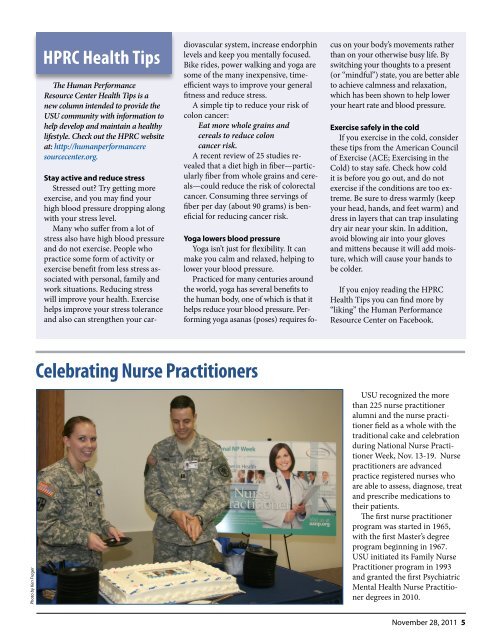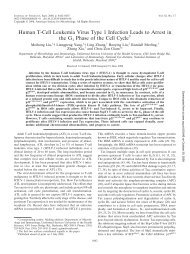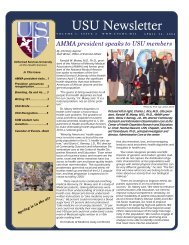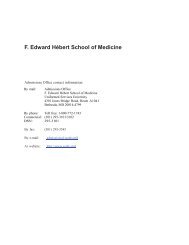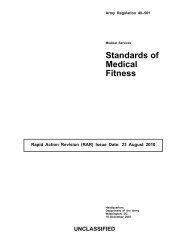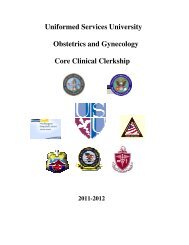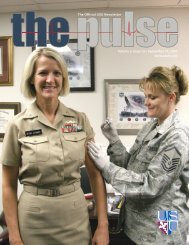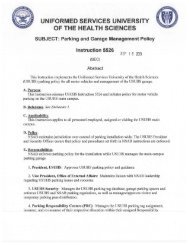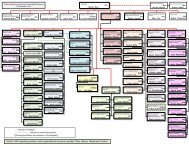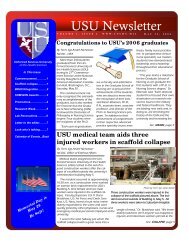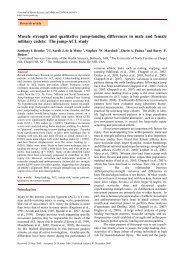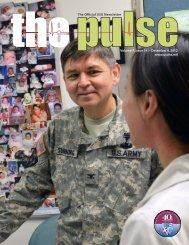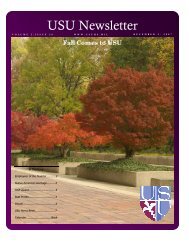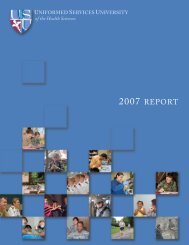Vol. 6, Issue 18 11/18/11 - Uniformed Services University of the ...
Vol. 6, Issue 18 11/18/11 - Uniformed Services University of the ...
Vol. 6, Issue 18 11/18/11 - Uniformed Services University of the ...
Create successful ePaper yourself
Turn your PDF publications into a flip-book with our unique Google optimized e-Paper software.
HPRC Health Tips<br />
The Human Performance<br />
Resource Center Health Tips is a<br />
new column intended to provide <strong>the</strong><br />
USU community with information to<br />
help develop and maintain a healthy<br />
lifestyle. Check out <strong>the</strong> HPRC website<br />
at: http://humanperformancere<br />
sourcecenter.org.<br />
Stay active and reduce stress<br />
Stressed out? Try getting more<br />
exercise, and you may find your<br />
high blood pressure dropping along<br />
with your stress level.<br />
Many who suffer from a lot <strong>of</strong><br />
stress also have high blood pressure<br />
and do not exercise. People who<br />
practice some form <strong>of</strong> activity or<br />
exercise benefit from less stress associated<br />
with personal, family and<br />
work situations. Reducing stress<br />
will improve your health. Exercise<br />
helps improve your stress tolerance<br />
and also can streng<strong>the</strong>n your cardiovascular<br />
system, increase endorphin<br />
levels and keep you mentally focused.<br />
Bike rides, power walking and yoga are<br />
some <strong>of</strong> <strong>the</strong> many inexpensive, timeefficient<br />
ways to improve your general<br />
fitness and reduce stress.<br />
A simple tip to reduce your risk <strong>of</strong><br />
colon cancer:<br />
Eat more whole grains and<br />
cereals to reduce colon<br />
cancer risk.<br />
A recent review <strong>of</strong> 25 studies revealed<br />
that a diet high in fiber—particularly<br />
fiber from whole grains and cereals—could<br />
reduce <strong>the</strong> risk <strong>of</strong> colorectal<br />
cancer. Consuming three servings <strong>of</strong><br />
fiber per day (about 90 grams) is beneficial<br />
for reducing cancer risk.<br />
Yoga lowers blood pressure<br />
Yoga isn’t just for flexibility. It can<br />
make you calm and relaxed, helping to<br />
lower your blood pressure.<br />
Practiced for many centuries around<br />
<strong>the</strong> world, yoga has several benefits to<br />
<strong>the</strong> human body, one <strong>of</strong> which is that it<br />
helps reduce your blood pressure. Performing<br />
yoga asanas (poses) requires focus<br />
on your body’s movements ra<strong>the</strong>r<br />
than on your o<strong>the</strong>rwise busy life. By<br />
switching your thoughts to a present<br />
(or “mindful”) state, you are better able<br />
to achieve calmness and relaxation,<br />
which has been shown to help lower<br />
your heart rate and blood pressure.<br />
Exercise safely in <strong>the</strong> cold<br />
If you exercise in <strong>the</strong> cold, consider<br />
<strong>the</strong>se tips from <strong>the</strong> American Council<br />
<strong>of</strong> Exercise (ACE; Exercising in <strong>the</strong><br />
Cold) to stay safe. Check how cold<br />
it is before you go out, and do not<br />
exercise if <strong>the</strong> conditions are too extreme.<br />
Be sure to dress warmly (keep<br />
your head, hands, and feet warm) and<br />
dress in layers that can trap insulating<br />
dry air near your skin. In addition,<br />
avoid blowing air into your gloves<br />
and mittens because it will add moisture,<br />
which will cause your hands to<br />
be colder.<br />
If you enjoy reading <strong>the</strong> HPRC<br />
Health Tips you can find more by<br />
“liking” <strong>the</strong> Human Performance<br />
Resource Center on Facebook.<br />
Celebrating Nurse Practitioners<br />
Photo by Ken Frager<br />
USU recognized <strong>the</strong> more<br />
than 225 nurse practitioner<br />
alumni and <strong>the</strong> nurse practitioner<br />
field as a whole with <strong>the</strong><br />
traditional cake and celebration<br />
during National Nurse Practitioner<br />
Week, Nov. 13-19. Nurse<br />
practitioners are advanced<br />
practice registered nurses who<br />
are able to assess, diagnose, treat<br />
and prescribe medications to<br />
<strong>the</strong>ir patients.<br />
The first nurse practitioner<br />
program was started in 1965,<br />
with <strong>the</strong> first Master’s degree<br />
program beginning in 1967.<br />
USU initiated its Family Nurse<br />
Practitioner program in 1993<br />
and granted <strong>the</strong> first Psychiatric<br />
Mental Health Nurse Practitioner<br />
degrees in 2010.<br />
November 28, 20<strong>11</strong> 5


